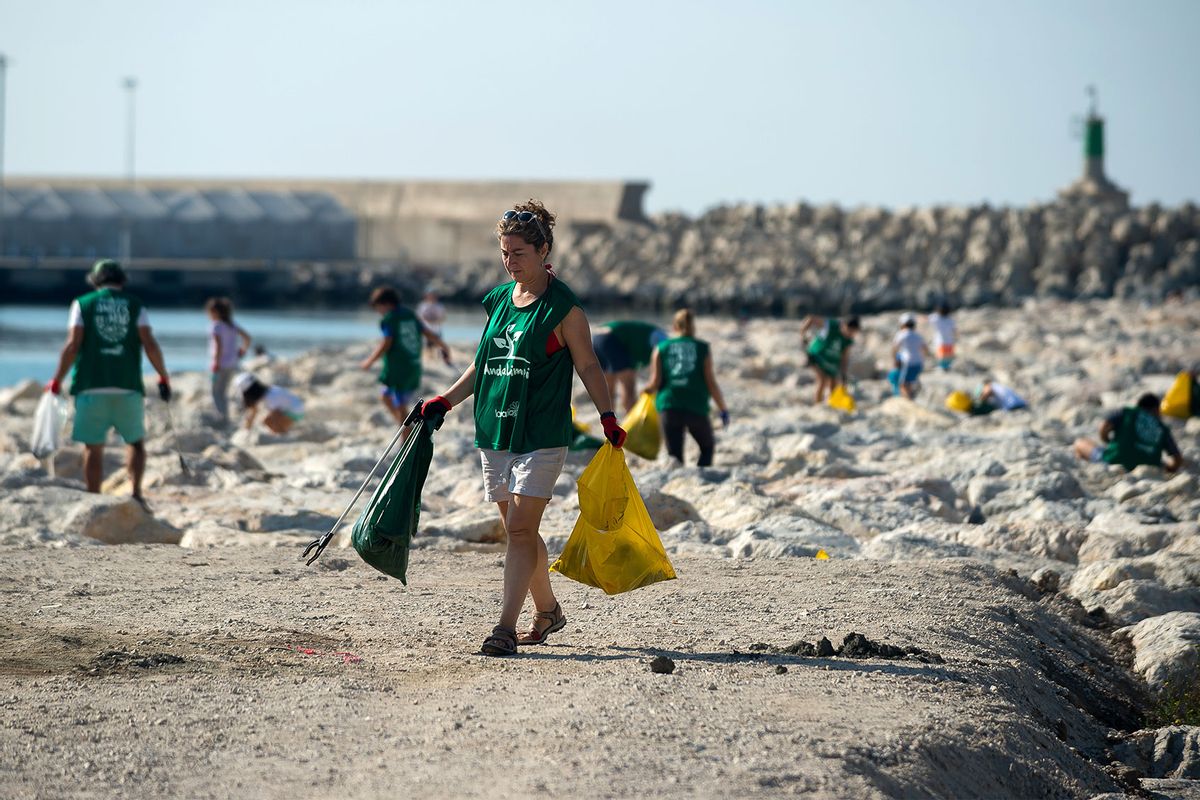For years, companies have been trying to offset their greenhouse gas emissions with carbon credits. Now, they want to do the same thing for their plastic pollution.
A growing number of companies are claiming "plastic neutrality" through the purchase of so-called plastic credits, tradable units that typically each represent 1 metric ton of plastic waste that's been removed from the environment. These credits, sold by dozens of unregulated businesses and nonprofits, are supposed to complement companies' internal plastic reduction strategies while also funding waste collection in the developing world.
Companies as varied as Burt's Bees, Nestlé, and the pet food brand Nature's Logic have vowed to neutralize at least some of their plastic footprint using credits. The beauty product company Davines, for example, says that for every piece of plastic it sells to consumers, it funds the removal of an equivalent amount of plastic from coastal areas in Indonesia, the Philippines, and Brazil.
"We are reaching a 1:1 balance between the plastic we use and the plastic we remove from the environment," the company says on its website.
But does plastic waste collection in one part of the world really "offset" the impacts from ongoing plastic production, use, and disposal somewhere else? Some experts and environmental groups are skeptical. They worry that plastic credits place a disproportionate emphasis on managing, rather than reducing, plastic garbage. Some say credits are just a way for polluters to burnish their reputations without taking responsibility for the plastic they produce.
"Frankly, it's all greenwashing," said Kevin Budris, advocacy director for the nonprofit Just Zero. "The only real solution to the full suite of plastic pollution problems is to stop making so much plastic in the first place."
If you look at most of the plastic crediting initiatives out there — and there are a lot — most of them offer a similar value proposition: Plastic credits can help fund waste collection in the developing world.
Here's how they work: A crediting organization funds a project that purports to collect plastic pollution, or prevent it from escaping into the environment. This could be a beach or river cleanup that collects low-value, nonrecyclable plastic waste and disposes of it in a controlled landfill. Or it could be a program to pay "waste pickers," the uncontracted workers who make their living by collecting refuse from dump sites and the natural environment and selling it to recyclers. The main requirement is that activities funded by plastic credits would not have taken place otherwise: They have to be "additional," in the industry parlance.
That crediting initiative then measures the amount of waste collected and posts the appropriate number of credits in a registry, usually one credit per metric ton. Companies buy those credits, and by doing so they support the underlying plastic collection activity.
According to Peter Hjemdahl, co-founder of the plastic crediting initiative Repurpose Global, this financing from the private sector is "critical" for cleaning up plastic waste and "empowering" waste pickers. After all, many parts of the world lack formal waste management infrastructure to deal with domestically generated trash, let alone the 14 million metric tons of plastic that enters the ocean each year and may wash up on their shores.
Hjemdahl claims companies want to fund these activities because their employees have "moral consciousness." But there are other, more practical reasons companies might want to buy plastic credits: According to Thierry Sanders, co-founder and director of the crediting company Circular Action BV, polluters that have to comply with "extended producer responsibility," or EPR, laws — policies that make companies financially responsible for dealing the pollution they cause — can use plastic credits to demonstrate that a certain percentage of the plastic they sell is ultimately collected and recycled. In Vietnam, for example, an EPR law enacted last year set mandatory recycling targets for a range of products, including plastic packaging. Any company wanting to sell plastic packaging could use plastic credits to prove that the required percentage of its sales was eventually recycled. (At least, they could prove that a certain amount of plastic was recycled; it would be nearly impossible to prove it was their plastic that was collected and turned into new products.)
The current reality, however, is that most parts of the world don't have EPR laws — which leads to the third and perhaps most salient reason companies are interested in plastic credits: for their marketing value. Credits are "more for corporations that want to make specific claims," said Vincent Decap, co-founder of a crediting initiative called Zero Plastic Oceans.
Indeed, many plastic crediting programs have a prominent section of their website explaining how companies can use credits to make green marketing claims, or affix proprietary labels to their products. Repurpose Global notes on its website that eco-friendly labels help products "scale significantly faster." PCX, another crediting organization, encourages brands to "wear your badge with pride," because doing so will help consumers "know you're the real deal."
Most of these badges and labels involve some kind of offsetting language, like "plastic neutral," "net circular plastic," and "net-zero plastic to nature." Similar to carbon credits, these claims generally mean that a company has purchased enough plastic credits to "offset" whatever plastic pollution it contributes to the world. In this way, the impact of one plastic bag sold to the public — and potentially littered into the ocean — is supposedly neutralized by the collection of an equivalent amount of plastic pollution by weight.
There are concerns that neutrality will be used to justify ongoing plastic use and production, since the phrase implies that plastic production can be impact-free as long as it is "canceled out" with credits.
The problem, however, is that not everyone believes those neutrality claims are the real deal. First is an equivalency concern: Unlike with carbon molecules, which one can reasonably assume will all behave similarly in the atmosphere, not all plastics are created equal. Plastic film is the most lethal form of plastic to marine life and is extremely difficult to remove from the environment and recycle. Plastics labeled with a number 3, 6, or 7 may be more likely than others to release hormone and endocrine disruptors. Meanwhile, PET water bottles, labeled with the number 1, aren't as dangerous to natural environments and tend to get recycled. Yet crediting programs may ignore these differences, using the collection of one polymer to ostensibly neutralize the impact of another.
More broadly, there are concerns that neutrality will be used to justify ongoing plastic use and production, since the phrase implies that plastic production can be impact-free as long as it is "canceled out" with credits. To the contrary, plastic — which is made from fossil fuels — causes harms at every stage of its life cycle. Oil and gas extraction can create air and groundwater pollution that harms people living nearby. Manufacturing can release additional pollution that disproportionately impacts low-income communities and people of color, and plastic products sitting on supermarket shelves can leach toxic chemicals into people's food and beverages.
According to Alejandra Warren, co-founder and executive director of the nonprofit Plastic Free Future, these impacts are by no means erased when a plastic producer in one country pays for garbage to be removed from another country's shoreline. "Plastic credits do not address the ongoing and future environmental injustices caused by the plastics industries around the world," she told Grist.
Plastic crediting organizations are not oblivious to these concerns, especially as the carbon market has become engulfed in controversy over alleged greenwashing and "phantom" carbon credits that don't actually cancel out ongoing greenhouse gas emissions. By selling potentially fraudulent carbon offsets, some lawyers say carbon crediting organizations have put themselves at risk of a "wave of litigation" from consumer protection lawsuits. According to the legal nonprofit ClientEarth, plastic creditors may be exposing themselves to the same risks.
Some crediting organizations are trying to distance themselves from those controversies by moving away from neutrality claims and toward something called a "contribution model," in which companies pay for plastic credits without the goal of claiming plastic neutrality. Rather than bearing a "net-zero plastic" label, a product might read, "This company paid for the removal of 5 tons of plastic litter in 2022."
That kind of label describes "what's actually happening," said Alix Grabowski, director of plastic and material science for the nonprofit WWF, "versus this vague term of 'neutral,' which no one knows what it really means." She said it would be helpful for regulators like the Federal Trade Commission, which enforces the United States' consumer protection laws, to step in with some clearer guidelines on these kinds of environmental claims. Others are hopeful that an initiative called the Plastic Footprint Network, composed of consulting groups, plastic crediting initiatives, and a small number of nonprofits, will rally the industry around a common set of standards.
Decap, whose organization Zero Plastic Oceans offers companies a label that reads "ocean-bound plastic neutral," said he hopes to switch to contribution-based labels by sometime next year. That way, he said, "we will not have this stain from what's happening in the carbon market, which is honestly pretty ugly." Hjemdahl also said more contribution-based language is needed, although he didn't say whether or when Repurpose Global would phase out its plastic neutrality labels.
Regardless of the kinds of claims companies make about plastic credits, they remain controversial. Credits represent a waste management approach to addressing the plastic pollution crisis, rather than the strict controls on plastic production that many experts and environmental advocates would prefer to focus on.
Hjemdahl, with Repurpose Global, said reducing plastic production needs to be prioritized "first and foremost," but also said that choosing one over the other creates a "false dichotomy" that is "actively allowing polluters to thrive amid the lack of clarity from practitioners." According to him, plastic reduction "is not going to have an impact by itself if there is no infrastructure to actually collect waste in the first place."
Environmental advocates, on the other hand, say it's the other way around: Even the sincerest efforts to ramp up waste collection and recycling will be futile in the face of the plastic industry's plans to triple plastic production by 2060 — a scenario that's expected to generate 44 million metric tons of plastic pollution annually. "If reduction and cleanup efforts are pursued simultaneously, but cleanup efforts are getting even an equal amount of attention, then those are resources and efforts that are misplaced," said Budris, with Just Zero.
He and others argue that cleanups like those encouraged by plastic credits align with the petrochemical industry's "sophisticated greenwashing" strategy to build good will among consumers and policymakers so they can justify not imposing caps or reductions on the production of plastic. This dynamic has played out prominently in negotiations for a global plastics treaty, in which oil-producing nations have called for more cleanups and recycling as an alternative to a cap on plastic manufacturing. It's also manifested in industry-led cleanup initiatives like the Alliance to End Plastic Waste, whose fossil fuel and petrochemical company members, including Exxon Mobil and Shell, have a vested interest in keeping the world dependent on plastics.
Budris called it "preposterous" to frame plastic credits as a way to support waste pickers in the developing world. So much of the plastic waste that pickers deal with, he said, can be traced to the fact that they're "drowning in a tide of single-use plastic" whose production they had no say in or control over.
"If these companies really want to do something to improve waste management in the Global South," he added, "they need to just stop making so much plastic. That's the easiest route to addressing so many of these issues."
Read more
about plastic pollution and recycling


Shares